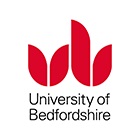

Location
United Kingdom
Qualification
Masters Degree (Taught)
Fees
GBP16900
(2026)
Duration
1 Year(s)
Next intake
09 March 2026
Entry Score
6
IELTSCourse info
- Scholarships
- Internships
Entry requirements for University of Bedfordshire
Application Deadline
The application deadline isn't available Speak to an IDP counsellor for more detailed information
Further information
If you aren't eligible for the above entry requirements, you might have a chance to explore pathway options at University of Bedfordshire. If you want to find out more, speak to our counsellors.
THE World Ranking
1001st / 1250
THE World Ranking126th / 130
Complete University guideWhat our students think
We’ve haven’t received any reviews for this institution yet.
Join the IDP student community
Connect with peers and student ambassadors to hear real experiences, tips, and advice about studying abroad.

Recommended for you
- Masters Degree (Taught)
- Next intake:09/2026
- AED174509 (2026)
- THE World Ranking:160
- Masters Degree (Taught)
- Suzhou , United Kingdom
- Next intake:09/2026
- Entry Score: IELTS 6.5
- CNY120000 (2026)
- THE World Ranking:160
- Masters Degree (Taught)
- Suzhou , United Kingdom
- Next intake:09/2026
- Entry Score: IELTS 6.5
- CNY120000 (2026)
- THE World Ranking:160
- Masters Degree (Taught)
- Suzhou , United Kingdom
- Next intake:09/2026
- Entry Score: IELTS 6.5
- CNY120000 (2026)
- Masters Degree (Taught)
- Dubai , United Kingdom
- Next intake:09/2026
- Entry Score: IELTS 6.0
- AED117548 (2026)
- THE World Ranking:160
- Masters Degree (Taught)
- Suzhou , United Kingdom
- Next intake:09/2026
- Entry Score: IELTS 6.5
- CNY100000 (2026)
- THE World Ranking:401
- Masters Degree (Taught)
- Dubai , United Kingdom
- Next intake:09/2026
- AED99528 (2026)
- THE World Ranking:401
- Masters Degree (Taught)
- Dubai , United Kingdom
- Next intake:09/2026
- Entry Score: IELTS 6.5
- AED99528 (2026)
Your action plan
Step 1
Shortlist your courses
Choose the best three courses you’re most likely to pursue.
Step 2
Check your eligibility
Get an instant in-principle offer for courses with the IDP FastLane tag.
Step 3
Apply through IDP Live
Fill out the form once and use it to apply to multiple courses.
How does IDP FastLane work?
With the FastLane 'Offer in Principle', you'll know in minutes if you'll be accepted!
Select an institution and course
Create your academic profile
Submit your application for an 'Offer in Principle'
Your chosen institution(s) will send you a decision in minutes!
Get ready to apply with an expert counsellor
